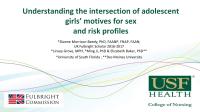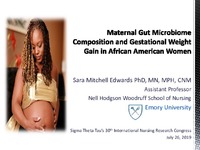Towards an understanding of pregnancy weight gain in African-American women
View File(s)
- Author(s)
- Details
-
Susan W. Groth, PhD, RN, WHNP-BC; Dianne Morrison-Beedy, PhD, RN, WHNP-BC, FNAP, FAANP, FAAN
Visitor Statistics
Visits vs Downloads
Visitors - World Map
Top Visiting Countries
| Country | Visits |
|---|
Top Visiting Cities
| City | Visits |
|---|
Visits (last 6 months)
Downloads (last 6 months)
Popular Works for Groth, Susan W. by View
| Title | Page Views |
|---|
Popular Works for Groth, Susan W. by Download
| Title | Downloads |
|---|
View Citations
Citations
Problem: A large proportion of women gain more weight than is needed during pregnancy. This is a major health issue because excessive gestational weight gain contributes to postpartum weight retention, which contributes to long term obesity in women and their offspring. African-American women in particular have high rates of obesity with half (49.6%) classified as obese and 14.2% as grade 3 obesity (BMI>=40kg/m2).
Theoretical base: A common construct across multiple behavior change theories, including social cognitive theory, is that behavior change is impacted by personal factors including risk appraisal and motivation to change.
Purpose: In order to determine the perspective of pregnant African-American women on weight gain in pregnancy we conducted formative work to elicit these antecedents to behavior change.
Method: Focus groups were conducted using rigorous approaches (e.g., trained moderator, standardized interview guide, taped transcripts analyzed verbatim) with 26 impoverished African-American women (age range 18-39 years).
Results: Between- and within- group analyses identified four themes: (a) Weight gain, no matter how much, means a healthy baby, (b) There is a limit: Weight gain impact on appearance, (c) Reluctant acceptance: It happens, and (d) Nebulous plans for controlling weight. These women clearly identified the need for weight gain to ensure a healthy baby. However, there was a great tolerance with amount of weight they could gain before it became unacceptable. Although they identified a few strategies for controlling weight (e.g. reducing fried foods), most women were unenthusiastic and half-hearted about controlling gestational weight gain.
Conclusions/Implications: The negative impact of excessive pregnancy weight gain on the infant was not identified. Intolerance of weight gain was almost exclusively due to appearance; it was never related to health risks. Understanding women's appraisal of risk and motivation to address excessive weight gain in pregnancy is key to successful intervention development tailored for this population.
41st Biennial Convention - 29 October-2 November 2011. Theme: People and Knowledge: Connecting for Global Health. Held at the Gaylord Texan Resort & Convention Center.
Items submitted to a conference/event were evaluated/peer-reviewed at the time of abstract submission to the event. No other peer-review was provided prior to submission to the Henderson Repository, unless otherwise noted.
| Type | Presentation |
| Acquisition | Proxy-submission |
| Review Type | Abstract Review Only: Reviewed by Event Host |
| Format | Text-based Document |
| Evidence Level | N/A |
| Research Approach | N/A |
| Keywords | Obesity; Gestational Weight Gain; Pregnancy |
| Name | 41st Biennial Convention: People and Knowledge: Connecting for Global Health |
| Host | Sigma Theta Tau International |
| Location | Grapevine, Texas, USA |
| Date | 2011 |
All rights reserved by the author(s) and/or publisher(s) listed in this item record unless relinquished in whole or part by a rights notation or a Creative Commons License present in this item record.
All permission requests should be directed accordingly and not to the Sigma Repository.
All submitting authors or publishers have affirmed that when using material in their work where they do not own copyright, they have obtained permission of the copyright holder prior to submission and the rights holder has been acknowledged as necessary.
Related items
Showing items related by title, author, creator and subjects.
-
A systematic review of gestational weight gain by obese women and maternal/newborn outcomes
Faucher, Mary Ann (2013-10-22)Session presented on: Wednesday, July 24, 2013: Purpose: A systematic review of gestational weight gain (GWG) in obese women, stratified by obesity severity, evaluated a mix of maternal and newborn outcomes, since the ... -
Understanding the intersection of adolescent girls' motives for sex and risk profiles
Morrison-Beedy, Dianne; Grove, Linsey; Ji, Ming; Baker, Elizabeth (2017-06-05)Purpose: Sexual risk behaviors resulting in HIV, STIs and unplanned pregnancy continue to pose a significant health risk to adolescent girls globally. Tested in a randomized controlled trial, the Health Improvement Project ... -
Scottish adolescents' sexual experiences and risk behaviors: Understanding for evidence-based intervention tailoring
Morrison-Beedy, Dianne; Martin, Caroline Hollins; Pow, Janette; Elliott, Lawrie (2018-06-01)Despite high rates of unplanned pregnancy and other negative sexual outcomes, detailed descriptions of Scottish adolescents sexual behaviors and risk reduction strategies are limited.We conducted in-depth focus groups with ... -
Maternal gut microbiome composition and gestational weight gain in African American women
Edwards, Sara MitchellNearly 80% of African American (AA) women of childbearing age report themselves to be overweight or obese. While the strongest predictor of excessive gestational weight gain is pre-pregnant weight, other contributors to ... -
The pre-pregnancy body mass index and gestational weight gain for women with gestational diabetes mellitus
Hung, Chich-Hsiu; Chiou, Yi-Ling; Liao, Hsiu-YunHealth care providers should emphasize the impact of pre-pregnancy BMI and GWG on the perinatal health of women with GDM in prenatal visit. It is necessary to provide childbearing women with additional health education in ...





